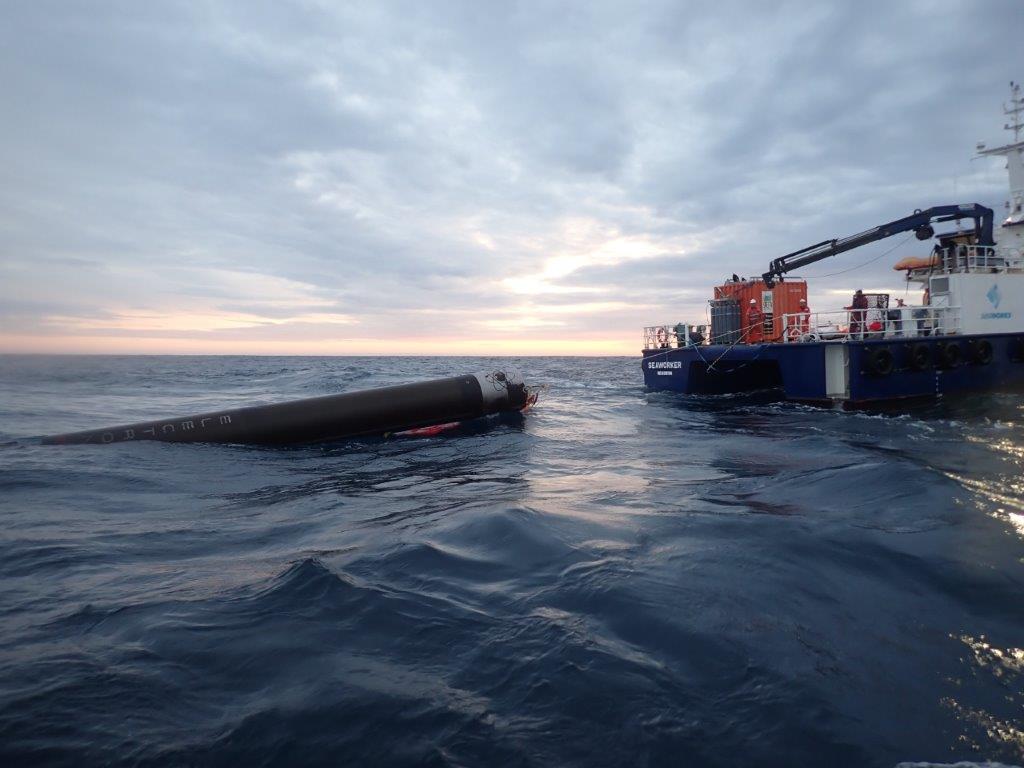
Rocket Lab will fish another booster out of the sea this weekend, if all goes according to plan.
The California-based company aims to recover the first stage of the Electron rocket that launches its next mission, which is currently targeted to lift off no earlier than Saturday (May 15) from New Zealand. That flight will be the 20th overall for the 58-foot-tall (18 meters) Electron, so the company calls it "Running Out of Toes."
Rocket Lab has performed an ocean recovery once before — in November 2020, on a mission dubbed "Return to Sender."
Related: Rocket Lab and its Electron booster in photos
The goal of such work is to help transition the two-stage Electron from an expendable vehicle, as it was originally designed, to a rocket with a reusable first stage. And inspection of the recovered booster from "Return to Sender" suggests that this vision is no pipe dream.
"We are more kind of bullish on this than ever before," Rocket Lab founder and CEO Peter Beck said during a teleconference with reporters on Tuesday (May 11). "We reentered on a very aggressive corridor, we had no upgraded heat shield, and we still got [the booster] back in remarkable condition."
Indeed, some parts of that rocket will fly again; the propellant pressurization system from the "Return to Sender" first stage has been incorporated into the "Running Out of Toes" Electron, Beck said.
Get the Space.com Newsletter
Breaking space news, the latest updates on rocket launches, skywatching events and more!
That soon-to-fly booster features an upgraded heat shield. And there are some other changes to the recovery plan, too. For example, Rocket Lab has built a hydraulic cradle dubbed ORCA ("Ocean Recovery and Capture Apparatus") that's designed to safely and softly pull the returned booster out of the sea and onto the deck of the recovery ship.
"So, we should be able to get a stage back in really great condition," Beck said. "It'll be wet, but it'll be in really great condition, versus some of the damage that the previous vehicle suffered as we boarded onto the boat in 5-meter [16 feet] swells."
Rocket Lab's ultimate recovery plan involves keeping Electron dry: The company will eventually catch returning boosters (which slow their descent using parachutes) out of the sky with a helicopter. Rocket Lab has practiced this technique using dummy boosters dropped from choppers and is confident that it will work. The main issue is the logistical complexity introduced by the need to have a capture copter in the right place at the right time, Beck said.
Rocket Lab plans to perform another ocean recovery after "Running Out of Toes," on an unspecified mission slated to launch later this year. The Electron first stage on that future mission will feature a new "decelerator" that Beck declined to discuss in detail.
"We're keeping that pretty close to our chest at the moment, because I think that is a really significant piece of technology," he said.
If all goes well with that third splashdown and recovery, Rocket Lab will "seriously consider" moving on to a midair helicopter catch during an orbital mission, Beck added.
Rocket Lab is developing another booster as well — a larger vehicle called Neutron, whose first stage is designed from the outset to be reusable. Returning Neutron boosters won't need parachutes; they'll land vertically and propulsively, as the first stages of SpaceX's Falcon 9, Falcon Heavy and Starship rockets do.
Neutron will benefit from the reentry trials of its smaller cousin, even though the two vehicles are very different, Beck said.
"Every time we reenter a stage, we just learn a tremendous amount about the environment, about what happens," he said. "And all of that is just being piped directly into the Neutron team."
Mike Wall is the author of "Out There" (Grand Central Publishing, 2018; illustrated by Karl Tate), a book about the search for alien life. Follow him on Twitter @michaeldwall. Follow us on Twitter @Spacedotcom or Facebook.
Join our Space Forums to keep talking space on the latest missions, night sky and more! And if you have a news tip, correction or comment, let us know at: community@space.com.

Michael Wall is a Senior Space Writer with Space.com and joined the team in 2010. He primarily covers exoplanets, spaceflight and military space, but has been known to dabble in the space art beat. His book about the search for alien life, "Out There," was published on Nov. 13, 2018. Before becoming a science writer, Michael worked as a herpetologist and wildlife biologist. He has a Ph.D. in evolutionary biology from the University of Sydney, Australia, a bachelor's degree from the University of Arizona, and a graduate certificate in science writing from the University of California, Santa Cruz. To find out what his latest project is, you can follow Michael on Twitter.









